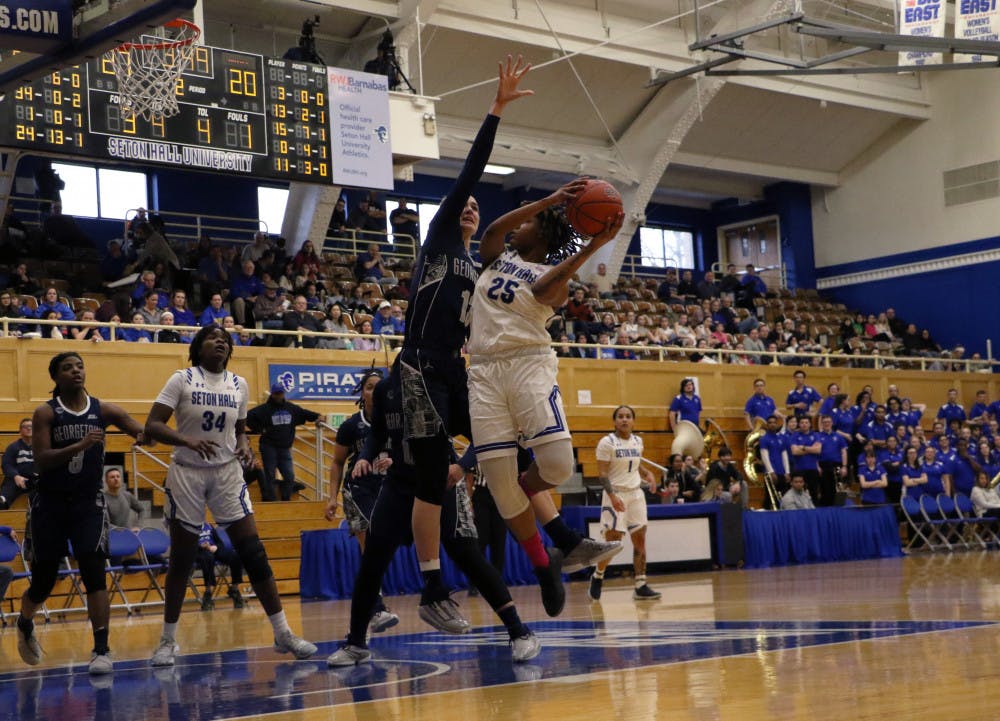At the point in Luther Wright's life when he was no longer playing basketball, suffering from a drug addiction and living on the street, it seemed as though he hit rock bottom.
As a result of a sudden change in his outlook on life and a newfound acceptance of faith, he was able to turn his life around on a rigorous road to recovery.
"It may sound simple, but I just got sick and tired of being sick and tired," the 7-foot-2-inch former Seton Hall basketball player said.
Wright, a native of Elizabeth, N.J. attended Seton Hall from 1990 to 1993. Due to low grades, he was ineligible to play in 1990, but raised them enough to earn a spot the following year.
"It was a tough time," he said. "I gained weight, partied a lot and almost got kicked out of school. I wasn't doing well at all."
During the 1993 NBA draft, Wright was drafted by the Utah Jazz in the first round, 18th overall. After moving to Salt Lake City, Utah, he began to feel the effects of homesickness quickly. He flew his family across the country so they could live nearby, though it was not enough.
It was not much longer before Wright suffered a "nervous breakdown" that forced him to retire early.
"I realized I was looking for an out from the start, but I went about it totally wrong," he said. "I had no experience with trying to get traded and one bad decision led to another."
Wright was misdiagnosed with manic depression for which he was given medication. He began smoking marijuana while still taking the medication and also became addicted to crack cocaine.
After losing the money he earned playing in the NBA to his drug addiction, the unemployed 23-year-old was faced with another problem: homelessness.
"When you live the life of an addict, you subject yourself to being out in a different environment, be it an abandoned car, street or porch," he said. "It was crazy, but I did it."
Four days before Christmas in 2004, the harsh conditions of winter caused Wright to have two frostbitten toes amputated.
Wright said it was at this stage in his life that he decided he did not want to be high anymore.
"The light turned on and everything just started happening for me."
He went back to school, started going to church and became a talk show host on a Christian radio station.
"I was saved," he said. "I dealt with life on life terms."
Wright has been clean for over six years and is now back at Seton Hall striving to earn his bachelors degree studying communications.
"Being on campus brings back a lot of great memories, he said. "I'm friends with a lot of the guys on the basketball team."
In addition to being a part-time undergraduate student, a husband and a father, Wright also plays lead guitar in a band that is part of the NBA Retired Players Association and typically performs three times a year.
What is known as "the world's tallest band" includes former professional players like Anthony Avent, Bob Elliott, Terry Cummings and Andy Toolson.
On Nov. 23, "A Perfect Fit," a book written by Wright that delves into "the good, the bad and the ugly" in his life will be released nationwide.
At 39, Wright credits his struggles earlier in life as what gave him the character and strength he now has.
"Life is designed to experience the good and the bad," he said. "I would not be the person I am today if I hadn't experienced that.
He said if he feeds the disease again, it can come back instantly.
"I've come too far to turn around," he said. "I understand that you can't do the same things over and over and expect to have a different result. All it takes is one drink or one smoke and I'm back to square one again."
Thanks to his faith, his family and an appreciation for everyday life, he said that will not happen.
Gabrielle Kiger can be reached at gabrielle.kiger@student.shu.edu





